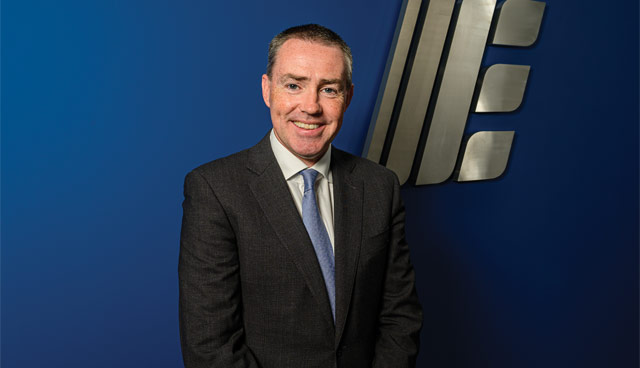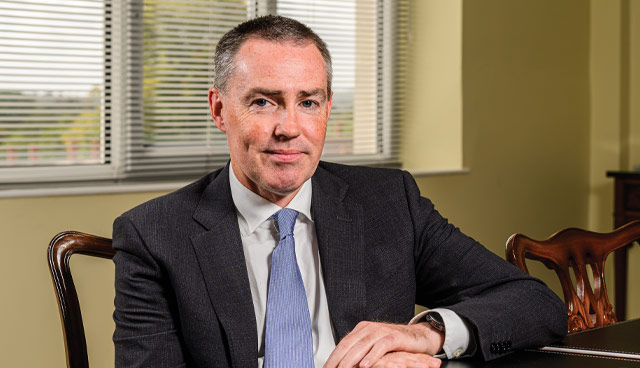Powering decarbonisation

As a significant contributor to the Northern Ireland economy, NIE Networks is embedded in every home, business and farm. Finance and Regulation Director, Gavan Walsh, talks to David Whelan about the key role the organisation is playing in actively supporting the decarbonisation transition.
The introduction by the UK Government of a target net zero carbon emissions by 2050 has put an onus on utility companies like NIE Networks to pave the way for the future by investing in their infrastructure, according to Walsh.
As such, supporting areas of demand growth and new forms of generation, particularly renewable generation, is a real focus for NIE Networks across Northern Ireland, alongside investing in the network to maintain the current service, he explains.
“Whilst much of our current investment is around maintaining and improving the network, we’re also investing in meeting new and evolving customer requirements, which, up until now have mainly been focussed on the connection of renewable generation, largely from onshore wind,” Walsh says.
In previous price controls, NIE Networks connected around 1,600 MW of renewable generation, a figure which has since risen to 1,800 MW. The delivery of these connections was a key factor in enabling Northern Ireland to produce some 44 per cent of its electricity from renewable sources for the 12 months to June 2019, above the initial 40 per cent target mapped out for 2020.
Our network can’t stand still. We’re actively looking at how our network can be adapted to respond to future requirements, while analysing how this can best be done at the least cost to the consumer.
Walsh outlines the complexities of meeting the demands of such evolution: “Over 90 per cent of new generators are connected to the distribution network, but this network was originally designed to facilitate the flow of electrical energy towards the customer only,” he explains. “Ensuring that Northern Ireland can harvest these new levels of renewable generation requires greater levels of investment, together with increased design and engineering outputs. However, our proven agility and high level of engineering skill, means we are well placed to deliver as requirements for access to the network continue to evolve.”
A prime example of this change is the search for solutions to tackle the heat and transport sectors, which combined with the electricity sector, make up around 60 per cent of Northern Ireland’s greenhouse gas emissions.
Electrification, Walsh believes, has a major role to play in the ambition for achieving net zero carbon emissions by 2050. However, he is clear that reaching this ambition will require multiple solutions, at least during the transition phase.
“We see ourselves as an essential player in this transition,” he says. “Whilst, for some, it may be efficient to continue sourcing their heating service from the gas network, there are areas where the expansion of the gas network doesn’t necessarily need to happen because there is an existing electricity network which can facilitate heating through heat pumps. Heat pump technology – which delivers two to three units of heat for every unit of power – is well tested internationally in terms of approach and delivery and can be a practical solution for Northern Ireland.
“However, if the electricity network is going to deal with the electrification of heat and transport, which we very much see it doing, it needs to be reinforced and this will require appropriate investment. The long-term benefits would be huge, with the delivery of clean, fossil-free electricity, powering the major carbon-emitting sectors of the economy and going a significant way to delivering a net zero agenda.”
Prosumer
Walsh explains that NIE Networks refuses to be a passive player in the climate transition, instead developing a strategy that will see it invest significantly across its network and operations in the coming years, and contributing proactively to a wider energy strategy for Northern Ireland.
Discussing how the role of the “prosumer” has reinforced the need to stay on top of changing network demands, Walsh says: “While we are extremely experienced in the operating of our network, we are also conscious of our requirement to respond to what our customers want. We must be agile to various demands. The role of the prosumer, customers who both produce and consume power, is central to a future energy strategy for Northern Ireland and we have a key role in connecting generation and consumption in whatever form that takes.”
NIE Networks is engaging with the Department for the Economy on the readying of a future energy strategy for Northern Ireland for an incoming minister. Walsh adds: “Our network can’t stand still. We’re actively looking at how our network can be adapted to respond to future requirements, while analysing how this can best be done at the least cost to the consumer.”
NIE Networks is part of the Energy Strategy Electricity Stakeholders Group established by the Department to feed into a consultation on a future energy strategy set to be opened next year. Walsh says that NIE Networks welcomes the opportunity to collaborate with other key players in the sector analysing the potential future energy mix for Northern Ireland and the implications of this on the grid and distribution system.
This collaboration is not just helping to map out the future direction of energy policy in Northern Ireland. Walsh adds: “Despite the various challenges, we need to get on and do the job of keeping the lights on for Northern Ireland. Yes, it would be great to have a future direction on energy policy, on the shape of the renewable mix or what will happen with Brexit, but we have businesses to facilitate and customers to service, so we can’t sit and wait. We will continue investing and addressing the challenges.”
Walsh explains that while there is rightly a forward-looking focus on the heat and transport sectors, Northern Ireland cannot rest on its successes in the renewable electricity sphere. The global trend of renewable electricity targets being brought forward and increased is likely to result in further challenges for NIE Networks.
“There is a significant potential issue in the increasing reliance on the production of electricity by wind or other intermittent generators in that, if they fall off quickly it becomes a challenge to maintain the quality of supply, which is critically important to enabling our network and ultimately our customers.”
Internationally, Northern Ireland is recognised as being at the “cutting edge” in terms of managing wind penetration, especially given that it is an island system with limited interconnectivity. The maintaining of frequency in the way that Northern Ireland has, is recognised as a major engineering feat and one for which NIE Networks has been credited.
“The entire network is carefully managed and balanced. If you are going to increase the penetration of those intermittent sources then further planning must be in place, including the right protections. NIE Networks works closely with SONI to match the load forecast and to match the infrastructure available around that and to ensure there is robustness around those sources. Any increase in wind penetration will require engineering solutions, some of which aren’t fully developed yet. That’s why we, along with other industry players, are investing in innovation.”
Ensuring that Northern Ireland can harvest these new levels of renewable generation requires greater levels of investment, together with increased design and engineering outputs.
Asked whether he believes the Northern Ireland electricity network is capable of delivering for a net zero future, Walsh responds: “The engineers involved have addressed all of the challenges that have been set out to them to date. I’m confident that the skills and ability exist, however, it’s recognised that the challenges become more complex as you try to get more performance from the network and the system, so that’s why we closely monitor our own structures and skill sets and adapt as we need to.”
Innovation
NIE Networks’ approach to the future electrification of heat and transport is two-sided, suggests Walsh. Firstly, on the policy side, the organisation is working to ensure that its future benefits are readily understood. Walsh stresses that such an approach is about taking the existing reliable network and, in a planned way, increasing its use to service increased heating and transport demands.
Secondly, NIE Networks is actively assessing the implications of increased electrification, responding to customer demand and trialling innovations. This also involves monitoring the progress of low carbon technologies and how they can be used to improve services. “We have got the mechanisms there to continue making investments in the network at a reasonable scale, enough to keep things moving to help those technologies be adopted,” he says, “but we will need further investment for roll out on a larger scale.”
As such, Walsh believes that NIE Networks’ next price control will be the space for the organisation to set out the approaches which are to be adopted to future-proof the network for those eventualities.
Quizzed on what bearing Brexit will have on those future-proofing plans, Walsh recognises the challenges that have been brought about by uncertainty and those posed by a potential no deal outcome. While he would prefer a greater deal of certainty, he is confident that the right analysis and planning is in place for NIE Networks to continue to deliver in all eventualities.
“We have done our own planning, determined the likely impacts and are clear on how we keep our activities fully operational. We’re confident we can deliver in these scenarios,” he says.
Walsh says that while the future outlook for energy policy in Northern Ireland remains fluid, for NIE Networks the future continues to be about the delivery of a safe, reliable electricity network servicing the needs of all of its customers, alongside playing a pivotal role in delivering the decarbonisation of our energy future.
NIE Networks: Serving the Northern Ireland economy
Serving 860,000 customers in Northern Ireland, NIE Networks operates and maintains the electricity distribution network and contributes close to £200 million annually to the local economy through investment, rates, taxes, salaries and contractors.
Over the course of the most recent price control (RP6), in place until March 2024, it will spend around £1.1 billion in ensuring that the electricity infrastructure across Northern Ireland is fit for purpose. RP6 includes the delivery of a £700 million capital investment programme in the network and £55 million of efficiency savings.
Fundamental to the significant investment associated with the maintenance and growth of its extensive 47,000 km network, are the company’s 1,200 staff – all of whom Gavan Walsh says: “live in the local economy and are passionate about what they do in serving their friends, family and neighbours.”
The Chartered Accountant, who took up his post in NIE Networks in November 2018, outlines that as well as investment expenditure, the organisation’s large reach also means that it has a key role in terms of consumer spend.
“Ultimately the goal for us is the delivery of a reliable and secure network that services all of our customers’ needs and which does so at an efficient cost.”
Outlining his belief that NIE Networks’ role is not always widely understood, he adds: “Our role is literally to transport the electricity from the point at which it is generated to the point where the consumer uses it. We do not generate electricity and we do not send the customer the end bill. Our costs contribute around 20 per cent of the bill customers receive from their supplier and that is something we are very conscious of. We recognise that all of our customers are paying for everything that we do and to that end we maintain a proud tradition of ensuring we adapt for efficiency and ensure our customer service is effective.”
NIE Networks currently connects approximately 9,000 customers to the network every year, each with varying degrees of timescale and labour intensity, whilst maintaining the high standard of service it delivers to its existing customers.
“We see ourselves as a vital part of the Northern Ireland economy, much like the region’s other utilities. Without NIE Networks and the services we provide there wouldn’t be lights, there wouldn’t be the ability to power data centres or operate machinery within key industries. Without electricity, very little operates in a modern economy, enabling jobs, supporting inward investment and facilitating a better standard of living.”
Walsh says that the ability to ensure that the key cogs of Northern Ireland society and the local economy can operate unhindered is a responsibility NIE Networks is very conscious of but one that they are handling extremely well. “Fast resolution of power cuts is particularly important to our customers and is a key indicator for us. In 2018, we achieved a ‘customer minutes lost’ average of 94 minutes, which is one of the best in our history and provides a huge degree of availability.”
Gavan Walsh is a chartered accountant with extensive experience across a number of industries including auditing, beef trading, financial services, telecoms and the energy industry. Before joining NIE Networks in November 2018, he worked for ESB for over 10 years, most recently as Financial Controller for ESB Innovation.







